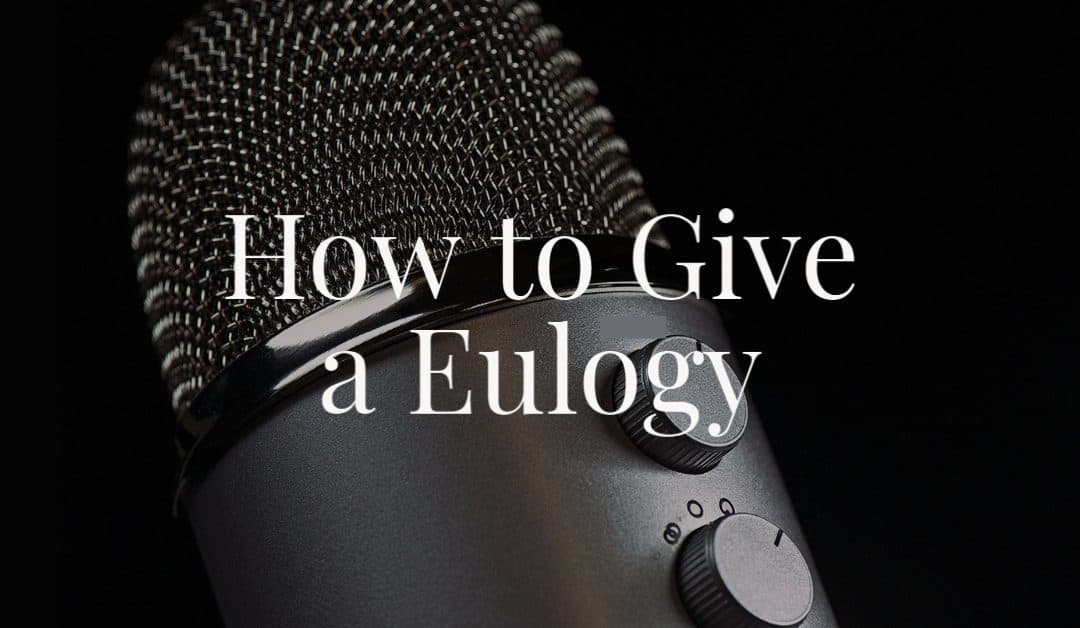By the time you are an adult, it’s likely that you’ve attended a funeral and seen someone give a “eulogy”. A eulogy is just a speech that praises someone who has died. Usually, family will ask one or more people to give a eulogy. Depending on the setting, the speech may be very formal or just an informal kind of remembrance over a dinner or drinks.
A eulogy usually contains socially appropriate types of stories that will resonate with the majority of people attending a funeral or memorial service. Most of what goes into a eulogy falls into 4 broad categories. Let’s look at what they are and also look at what not to say in a eulogy.
Remembrances of Good Times Together
Whatever you share about the deceased needs to be suitable for everyone who is watching online or is in attendance. Leave vulgarities, curse words, stories about crimes or questionable pranks out of your speech.
If you once had a blast with the deceased as kids growing up together shooting birds on a protected nature preserve, tell your buddies about it, but not the entire funeral service. If the deceased broke into a house as a prank but someone may still be upset about it, don’t bring it up during a eulogy.
Just because something is funny to your poker buddies or college friends doesn’t mean that the deceased’s family and friends need to hear about it. As an adult, you hopefully have an understanding of what others will find appropriate. Stick with tactful kinds of stories appropriate for children, teens, and your elders. Leave out anything that is in a gray area and save it for small groups of friends your own age.
Stories that Show Character
When people go to a funeral, they want to be inspired about how someone fought bravely, lived daringly, or loved without fear. Telling stories about how the deceased grew into a person of character gives everyone hope and lets the deceased be remembered for who they were inside, not just their outward job or status.
If your friend rushed into a burning building trying to save people and you were there, now is the time to tell everyone how brave and selfless your friend was. If the deceased had 5 foster kids and was a selfless kind of parent who was always giving more than she had, share about who she was and what made her want to put others first. These are the kinds of things everyone wants to hear about.
Stories that Show Love or Kindness
We all want to believe that others are loving and kind, that they are willing to forgive and give mercy to others. If you can talk about a time that the deceased showed emotional vulnerability by giving undeserved kindness or forgiveness, this kind of story can give hope.
You can help set the tone for the funeral service by remembering the good. We all have bad sides, but most of us also have some good characteristics that should be pointed out in a eulogy. Dig through your memories of the deceased and focus on the gold instead of the dirt.
Why They will be Missed
If you were chosen to give a eulogy, it is likely that you knew the person well and perhaps even spent quite a bit of time getting to know them and living life together. When someone is involved in your life so often, it is impossible not to miss them when they are gone. Talk about the things that you will miss most about the deceased.
Perhaps they liked to do little things that meant so much to you like leaving you sweet post it notes or packing you a lunch. Perhaps they always were there to lend an ear when you were sad. Maybe they selflessly helped with babysitting your kids or went out of their way to make your work life better. Whatever they did that you will miss is worth sharing. It is likely that others attending the service will feel the same way.
You are Not Alone
It is soothing to know that others will miss the deceased as much as you will. None of us want to face the process of grieving on our own. Knowing that there is a community who is also grieving can help give you and others comfort. The funeral is a place to share the pain of losing someone together by remembering the good times, the love, the shared hearts, the times of togetherness and then seeing your pain reflected back in the eyes of others.
It’s ok if you tear up some during a eulogy. Just take a breath, think about how much you want to honor their memory, and then let your words help others to grieve and understand that they are not alone.
Don’t Talk about These Types of Things
According to Lastly.com, these are some topics better left out of a eulogy:
- Focusing on cause of death
- Faults/shortcomings
- Old hurts
- Grudges
- Past arguments/disagreements
- Family rifts
- Bad memories
- Unhealthy rivalries
- Crimes
- Poor treatment of others
- Poor decisions
- Emotional baggage
- Inappropriate stories
- Inappropriate humor
- Justifying/minimizing the loss
- Anything offensive
- Anything your conscience is telling you not to say
Seek Help
At Renaissance Funeral Home, we want to help with all aspects of death and funeral arrangements. This is why we offer resources to bring knowledge about how grief and life after the death of a loved one works. We offer grief counselors and help with planning memorial and funeral services in addition to a library of podcasts and blogs to help you cope with everything from planning a funeral to choosing a burial type to helping a child grieve.
As a trusted community resource, we hope you’ll let us know if we can help in any way.


